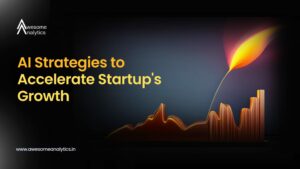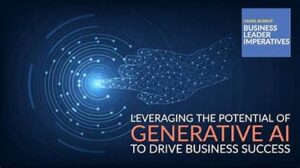
In the ever-evolving landscape of business, artificial intelligence (AI) has emerged as a transformative force, revolutionizing how companies operate and grow. As we move into 2024, leveraging AI for business growth is not just a competitive advantage but a necessity. This article explores top strategies for harnessing the power of AI to accelerate your success and achieve unprecedented growth.
1. Automate Routine Tasks to Boost Efficiency
One of the most immediate benefits of AI is its ability to automate routine tasks. Automation frees up valuable time and resources, allowing your team to focus on higher-value activities. Here’s how you can implement AI-driven automation:
- Customer Service: AI chatbots and virtual assistants can handle a high volume of customer inquiries, provide instant responses, and resolve common issues. This reduces the workload on your human agents and enhances customer satisfaction.
- Data Entry and Processing: AI can automate repetitive data entry tasks, reducing errors and increasing accuracy. Tools like robotic process automation (RPA) streamline processes such as invoice processing, inventory management, and more.
- Marketing Campaigns: AI tools can automate email marketing, social media posts, and ad placements, optimizing these processes based on real-time data and user interactions.
2. Enhance Decision-Making with Predictive Analytics
AI-driven predictive analytics can provide invaluable insights into future trends and behaviors, helping businesses make informed decisions. Here’s how to leverage predictive analytics:
- Customer Insights: AI can analyze customer data to predict purchasing behaviors, preferences, and trends. This allows you to tailor your marketing strategies, product offerings, and customer engagement efforts to meet the specific needs of your audience.
- Demand Forecasting: AI can predict demand patterns based on historical data, market trends, and other variables. This helps optimize inventory management, reduce stockouts, and improve supply chain efficiency.
- Risk Management: Predictive analytics can identify potential risks and vulnerabilities in your business operations. By analyzing data from various sources, AI can help you mitigate risks and develop contingency plans.
3. Personalize Customer Experiences
Personalization is key to building strong customer relationships and driving growth. AI enables businesses to deliver personalized experiences at scale. Here’s how to use AI for personalization:
- Product Recommendations: AI algorithms can analyze customer behavior and preferences to recommend products or services that align with individual interests. Personalized recommendations increase the likelihood of conversions and customer satisfaction.
- Dynamic Pricing: AI can adjust pricing based on real-time factors such as demand, competition, and customer profiles. Dynamic pricing ensures that your pricing strategy remains competitive and maximizes revenue.
- Targeted Marketing: AI can segment your audience based on various criteria and deliver personalized marketing messages. This improves engagement and conversion rates by addressing the specific needs and interests of different customer segments.
4. Optimize Operations with AI-Driven Analytics
AI-powered analytics provide deep insights into your business operations, helping you identify areas for improvement and optimize performance. Here’s how to use AI for operational optimization:
- Process Optimization: AI can analyze operational data to identify inefficiencies and suggest improvements. For example, AI can optimize manufacturing processes, supply chain logistics, and resource allocation.
- Performance Monitoring: AI tools can monitor key performance indicators (KPIs) in real-time, providing actionable insights into your business performance. This helps you make data-driven decisions and address issues before they escalate.
- Fraud Detection: AI can analyze transaction patterns and detect anomalies that may indicate fraudulent activity. By identifying potential fraud early, you can protect your business and maintain trust with your customers.
5. Foster Innovation with AI-Enhanced R&D
AI can accelerate research and development (R&D) efforts, driving innovation and creating new opportunities for growth. Here’s how to leverage AI for R&D:
- Product Development: AI can analyze market trends, customer feedback, and competitive data to inform product development strategies. This helps you create innovative products that meet market demands and stand out from the competition.
- Accelerate Testing: AI can simulate various scenarios and test prototypes faster than traditional methods. This speeds up the development process and reduces time-to-market for new products.
- Enhance Creativity: AI tools can assist in brainstorming and generating new ideas by analyzing vast amounts of data and identifying patterns that may not be apparent to human researchers.
6. Leverage AI for Talent Management and HR
AI can also transform human resources (HR) and talent management processes, making them more efficient and effective. Here’s how to utilize AI in HR:
- Recruitment: AI-powered tools can screen resumes, identify suitable candidates, and automate the recruitment process. This reduces the time spent on manual tasks and helps you find the best talent faster.
- Employee Engagement: AI can analyze employee feedback, performance data, and engagement metrics to identify areas for improvement. This helps create a positive work environment and enhances employee satisfaction.
- Training and Development: AI can personalize training programs based on individual needs and performance. This ensures that employees receive relevant and effective training to enhance their skills and career growth.
7. Implement AI for Strategic Planning and Forecasting
AI can enhance your strategic planning and forecasting efforts by providing data-driven insights and predictive capabilities. Here’s how to integrate AI into your strategic planning:
- Market Analysis: AI can analyze market trends, competitor activities, and customer behavior to inform your strategic decisions. This helps you identify opportunities, anticipate challenges, and develop effective strategies.
- Scenario Planning: AI can simulate different scenarios and outcomes based on various factors. This allows you to assess potential risks and opportunities, and develop contingency plans to navigate uncertainties.
- Long-Term Planning: AI can provide insights into long-term trends and projections, helping you develop sustainable strategies for future growth and success.
Conclusion
Leveraging AI for business growth in 2024 offers numerous opportunities to enhance efficiency, improve decision-making, and drive innovation. By automating routine tasks, utilizing predictive analytics, personalizing customer experiences, optimizing operations, fostering innovation, enhancing HR processes, and implementing strategic planning, businesses can accelerate their success and stay ahead of the competition. Embracing AI is not just about keeping up with technological advancements but about positioning your business for long-term growth and prosperity. Start integrating AI into your business strategy today and unlock its full potential to achieve remarkable success in the coming year.



